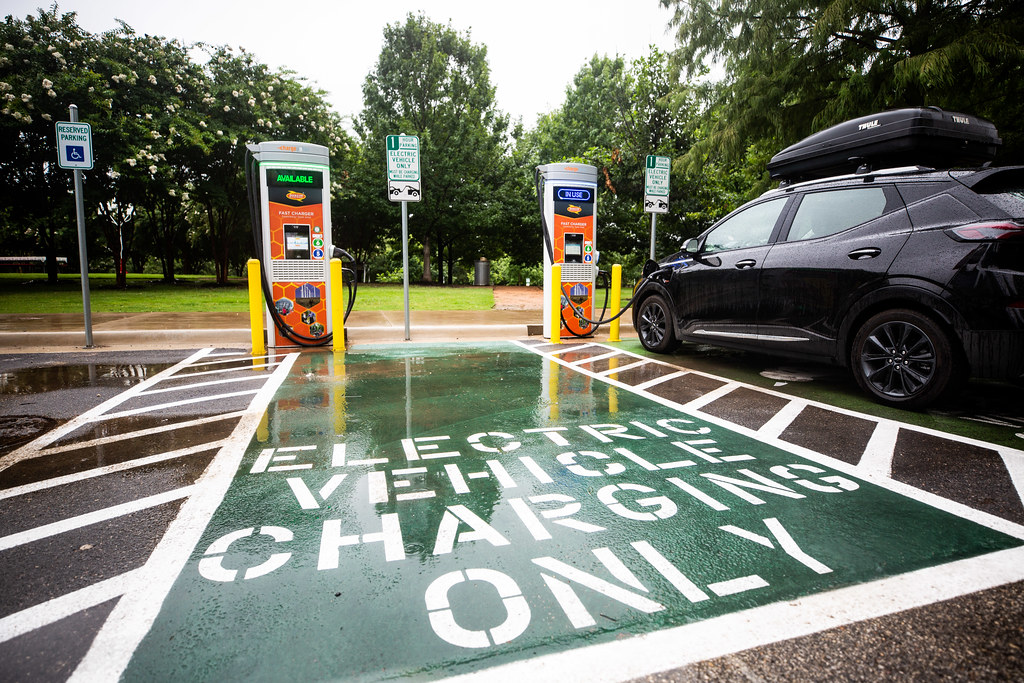Beginning Sept. 1, electric vehicle owners in Texas must pay an annual fee of $200 to the state as a result of Senate Bill 505, passed earlier this year. Those who purchase a new EV will have to pay two years of registration – $400 – up front.
Supporters say EV drivers, who don’t pay state or federal gas taxes, should contribute their fair share to maintaining the state’s roads. Advocates for increased electric vehicle use say the new fee will discourage some people from choosing EVs.
Sam Abuelsamid, principal research analyst for mobility ecosystems at Guidehouse Insights, says 33 states now have some sort of EV fee, with Texas’ among the highest. Texas’ fee is among the highest of the 33 states that now have some sort of EV fee. Listen to the interview above or read the transcript below.
This transcript has been edited lightly for clarity:
Texas Standard: How much of a kerfuffle has this kicked up? I’ve seen a lot of comments from EV drivers saying, ‘wait a minute, we’re doing something good for the economy and the environment. Why should we have to pay $200 on top of that for the privilege of doing the right thing?’
Sam Abuelsamid: Well, what you’re paying for is the the ability to have roads to drive those EVs on. We’ve always, or at least for a long time, had gas taxes that are used to fund the construction and maintenance of the roads that vehicles use. And EVs obviously don’t pay those because they don’t buy any gas. So this is essentially replacing that.
And Texas is by no means the first. There are now 33 states that are charging various fees to EV owners to substitute for the revenue that they would have been getting for gas taxes.
Does this really make some sort of sense? And is it inevitable that buyers of these have to pay this? You could conceivably structure this any way you wanted to. You could put a kind of tax on manufacturers who choose to do business in Texas. You could do any number of things and not saddle the purchaser with a $200 fee.
This is not my preferred approach to doing this. Traditionally, it’s been the feeling that those that use the roads should be the ones that pay for them. And especially those that put the most wear and tear on the roads, which is why the gas tax has always been a pretty reasonable proxy. Larger, heavier vehicles that use more fuel also tend to put more wear and tear on the roads.
I think a flat tax like this is not the ideal solution. It is the solution that most states are going with right now. A better solution, I think, would actually be transitioning away from fuel taxes entirely and moving towards a VMT tax – a vehicle miles traveled tax – that also factors in vehicle weight.
So those that don’t drive very much, you know, if you only drive a few thousand miles a year, you’re not going to pay very much. Those that drive more and put more wear and tear on the roads are going to pay more. And if you drive a larger, heavier vehicle – for example, a GMC Hummer EV that weighs over 9,000 pounds, puts a lot more wear and tear on the roads – you should probably pay more than somebody driving a Chevy Volt.
» GET MORE NEWS FROM AROUND THE STATE: Sign up for our weekly ‘Talk of Texas’ newsletter
How do other states compare with Texas?
Texas is at the higher end of the range, but it’s not totally out of line. Michigan, I think, is about $150. I think Washington is about $220 or $230 a year. And there are some states that are as low as $50 a year. And when you compare it to what you might be paying in fuel taxes for driving like the pickup truck, which is very popular in Texas, you’re probably paying a little bit less than you would be in fuel taxes for a vehicle like that.
You see these numbers in Michigan and Texas, both on the high end of the scale there. And we also know that Texas leaders are fans of this state’s oil and gas industry. Is there a political component to this?
I don’t think so. Well, in Texas, there probably is at least something of a political component to it, but in general, there’s not you know, it’s just a matter of trying to substitute the revenue that’s being lost in fuel taxes. This is an easy way to do it. It’s kind of a crude method of doing it, but it’s not a totally punitive means of doing it just because somebody’s driving an EV.
Are user fees going to keep more people from choosing EVs, do you think? That’s the argument that some are making.
I don’t think it’s going to have a huge impact, especially, you know, if it’s explained – this is what you’re doing. It might have an impact on some people because they’re seeing it as a one time fee every year. Whereas if you’re paying it as part of your usage of the vehicle, as a vehicle miles traveled tax, then it becomes more transparent; it’s less visible to the user, just as gas taxes are today.













